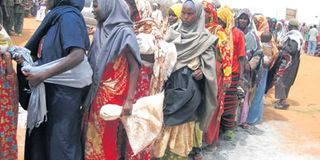WFP to reduce food rations for refugees in Kenya by 50pc

Women queue for food at the Dadaab refugee camp in northern Kenya. WFP has said that food rations for refugees in Kakuma and Dadaab camps would be reduced by 50 per cent. The situation is expected to persist until the end of January 2015. FILE PHOTO | NATION MEDIA GROUP
What you need to know:
- WFP said that the cut, which is to start on Saturday, is the result of insufficient funding.
- WFP said it is struggling to raise US$38 million to cover its refugee operation for the next six months.
- It distributes 9,700 metric tons of food monthly to some 500,000 refugees in Kenya, at a cost of almost US$10 million.
- From mid-November 2014, the refugees will receive a food ration equivalent to 1,050 kilocalories per day.
The World Food Programme (WFP) will reduce by half food rations given to about half a million refugees in Dadaab and Kakuma camps in northern Kenya.
WFP said that the cut, which is to start on Saturday, is the result of insufficient funding.
“WFP has done everything it can to avoid reducing rations, using all means at our disposal to cover critical funding gaps,” said Paul Turnbull, WFP deputy country director for Kenya.
WFP said it is struggling to raise US$38 million to cover its refugee operation for the next six months.
This includes US$15.5 million urgently required to address food needs through January 2015.
“Cutting rations is the last resort and we’re doing it to eke out the limited food we currently have available over the next ten weeks, as we continue to appeal to the international community to assist,” it said.
WFP distributes 9,700 metric tons of food monthly to some 500,000 refugees in Kenya, at a cost of almost US$10 million.
The refugees are provided with a food ration of cereals, pulses, vegetable oil, a nutrient-rich maize-soya blend and salt, providing 2,100 kilocalories per person per day, the recommended emergency ration.
From mid-November 2014, the refugees will receive a food ration equivalent to 1,050 kilocalories per day, WFP said.
“WFP depends entirely on voluntary contributions from donors who generously support food assistance for refugees,” said Valerie Guarnieri, WFP's regional director for East and Central Africa.
The reduced rations are expected to go on until the end of January 2015 when a shipment of food donated by the US government, is expected to arrive.





